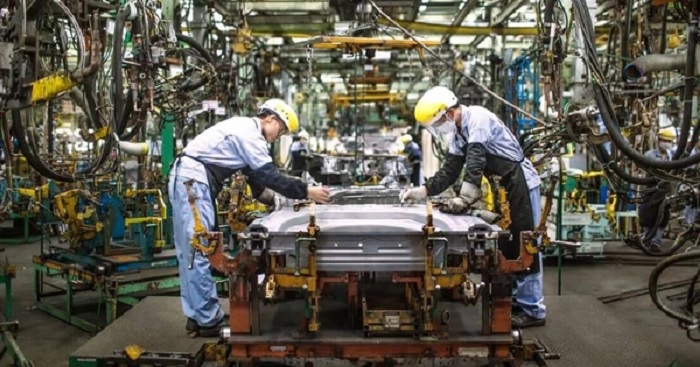Vietnam remains favored destination for foreign investors despite COVID-19
Despite the complexity of the COVID-19 epidemic, Vietnam is still a bright spot for foreign investors. Vietnam has increased its competitiveness and resulted in positive outcomes in foreign direct investment (FDI) attraction.
A recent report of the Foreign Investment Agency (FIA) shows that, the total new, adjusted capital and share purchases by foreign investors reached 31.15 billion USD in 2021, up 9.2 percent annually. Specifically, as many as 1,738 projects received investment licenses with a total registered capital of over 15.2 billion USD, down 31.1 percent in volume and up 4.1 percent in value year-on-year.

Other 985 projects registered additional capital of more than 9 billion USD. Nearly 6.9 billion USD was recorded in share purchases. Foreign investors have so far poured capital into 18 out of 21 Vietnamese economic sectors. Manufacturing and processing sector took the lead with over 18.1 billion USD in investment capital, or 58.2 percent of the total. It was followed by electricity production and distribution, real estate, wholesale and retail.
Despite the complicated development of COVID-19 pandemic, Vietnam remains a safe and attractive destination for foreign investors.
Harry Loh, General Director of UOB Bank Vietnam, highly appreciating that people have always cooperated strongly, closely and supported the Vietnamese Government to quickly control the epidemic. The fact that many businesses adapt, grasp, and gradually apply digital technology in practical business models also create positive signs of the economy and help promote national digital transformation.
In addition to implementing many measures to support people and businesses, Mr. Harry Loh also highly appreciated the plans of the Government of Vietnam in promoting economic recovery, in which priority is given to restoring the supply chain, promoting large-scale production and investment, solving difficulties and obstacles that businesses, including FDI enterprises are facing, improving institutions according to international standards and developing human resources. force.
Assessing the prospect of attracting FDI in Vietnam, Mr. Harry Loh, General Director of UOB Bank in Vietnam, said that FDI inflows will remain resilient thanks to three main reasons. Firstly, despite obstacles from Covid-19-related travel restrictions, FDI is still flowing strongly into Vietnam. Second, exports to the US and Europe are still growing strongly, albeit at a slower pace. Third, vaccination rates across the country have improved significantly.
"With the shift in response to the pandemic, Vietnam's economy will recover strongly and FDI inflows into Vietnam will still increase," said General Director of UOB Bank in Vietnam.
Meanwhile, amid fears that businesses would be irreparably impeded as a result of the prolonged social distancing period, according to Takeo Nakajima, chief representative of the Japan Trade Promotion Organization (JETRO), more than 55 per cent of Japanese businesses still want to expand their operations in Vietnam in the next 1-2 years (the highest proportion among ASEAN nations).
He added that, 42.5 per cent of businesses plan to remain at their current size while only 1.9 per cent want to trim down or close their operations.
As a result of its market size and development potential, Vietnam consistently ranks among the top destinations for Japanese companies looking to expand their operations abroad. Furthermore, as compared to other nations, Vietnam's socio-political stability and high quality of labor are distinguishing characteristics, said Takeo.
When it comes to the future of Japan's investment flow, Takeo is fairly optimistic. He believed a large number of agreements between Vietnamese and Japanese enterprises worth billions of dollars were made during Vietnamese Prime Minister Pham Minh Chinh's visit to Japan in November, particularly during his visit to Tokyo. This would be a critical precondition for new Japanese investment projects in Vietnam.
Mr. Takeo also revealed that 39 Japanese corporations on the government's list of companies receiving aid in diversifying supply chains are in the midst of preparing equipment and relocating manufacturing lines to Vietnam.
Nguyen Van Toan, Vice Chairman of the Vietnam Association of Foreign Invested Enterprises, stated that due to serious impact of the pandemic, many FDI enterprises faced difficulties in production and business activities. However, these difficulties are only temporary and the possibility of foreign investors moving their supply chain out of Vietnam is very small.
According to Toan, multinational corporations and businesses from EU, Japan, Korea, North America can choose 2022 as the time to restructure, allocate resources and restructure their global production-supply network. Therefore, Vietnam can still take advantage of its favorable geographical position, improved and progressive business-investment environment to attract investors.
To continue to take the lead in the race for FDI, the experts said that the Government, relevant ministries, branches and localities need to implement a number of solutions to "retain" and promote foreign investment attraction. At the same time, the country must also focus on developing regulations and standards as a new filter to select environmentally friendly foreign investors with advanced technology and the ability to withstand pressure from outside to maintain and ensure the national security of the country.

